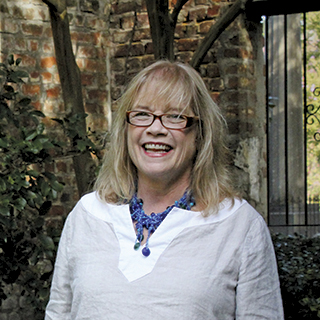One Book, One Community, One More River
Permanent link All Posts
Author Mary Glickman was not born in the South, nor to a Jewish family, but her passion, connection, and dedication to both Southern culture and Judaism inspires and informs her writing.
Born on the south shore of Boston, Glickman was always fascinated by faith. Though she attended Catholic school as a child and wanted to become a nun, her attention turned to the Hebrew Bible and she began what would become a lifelong relationship with Jewish culture. She later converted to Judaism.
Glickman's first novel, Home in the Morning, published in 2010, has been optioned for film by Jim Kohlberg, director of The Music Never Stopped (Sundance 2011), and is currently in development. One More River, a finalist for the Jewish Book Award, is her second published book. She is working on her next novel, a continuation of this series which welcomes the reappearance of Aurora Mae, ready for publication next fall.
Mary and her husband Stephen now live in North Carolina with their cat and a horse named King of Harts.

You've said: "Joseph Campbell said that religion is the poetry that speaks to a man's soul and Judaism was my soul's symphony" How has Judaism impacted your life and your writing?
Recently, scientists have concluded that humans are hard-wired for religious belief which makes a spiritual life an organic need. Campbell's dictum adds a mystical element to the discussion. He seems to say that religion goes deeper than familial training or social environment: it goes to the bone.
I was raised by an observant Irish Catholic mother. Much of my education was under the guidance of the good sisters of that faith. But it never took with me. I felt that innate need for a spiritual life and always, I was drawn to the Tenakh along with the geniuses of Jewish literature. The first time I heard Ashkenazi melodies, I had tears. If that's not the pull of religion on one's soul, I don't know what is. My identity is 100 percent Jewish. It's been so for more than 40 years. How could my identity not influence my work as a writer?
And tell me about your love for the South?
When I first came to live in the South, I was bowled over by the beauty of the Southern landscape, its intense devotion to history and family, its emphasis on civility in social discourse. I found a gorgeous wealth of inventive idiom in Southern speech (catnip to an author!). And I noted an ease of relations between the races I didn't find up North. That was a revelation. My Southern life is a constant learning experience about both its priceless cultural traditions and how a society can struggle to and succeed in conquering the legacy of an ugly past.
What was your inspiration for this book?
I began writing in a Southern voice as a corrective of the Hollywood stereotype of the South as a quaint and unsophisticated place stocked like trout in a pond with race-baiting thugs, bigots in seersucker, and melting belles. The protagonist of One More River, Mickey Moe Levy, was born in my first novel, Home in the Morning, where he had a strong but supporting role. I just wasn't done with him. Knowing the Southern fixation on family trees, I thought a mystery around his father's identity would provide an interesting conflict to hang a plot on. And then the Flood of 1927 came into my purview. As Mickey Moe is part of the Civil Rights Era generation and his father was the right age to experience the Great Flood, it seemed interesting to pair the two revolutionary events that shaped the South in the 20th Century. That one was man-made and the other natural only made them more interesting to pair.
What do you hope your readers will take away?
I hope they'll share a sympathetic view of the South, one more accurate than that the media generally allows. And of course, I hope they're moved and enriched by the experiences of my characters. For me, fiction should be character driven. If the reader bonds with one's characters, the goal has been attained.
Why did you choose to make your characters Jewish in the book?
The Southern Jewish Experience has been underreported in fiction and it was quite different from the Northern one. Jews have prospered in the South since colonial days and with a greater degree of acceptance by the dominant culture than that experienced in the North. Jews have played significant roles in Southern politics, economies, and culture from the 17th century onwards. I wanted to both pay homage to that experience and help bring it to the forefront of American Jewish consciousness.
The book is full of themes of self-discovery, race relations, historical lessons, civil rights, women's rights and so much more, but the overarching theme is love. Is the message that love can conquer all?
I don't know if love conquers all but it survives all. The noblest acts of men and women are committed in its name. You'll notice that not all the great love in One More River is requited. But it endures and commits itself honorably. Something that not every reviewer has noted but something very important to me is One More River's theme of the very powerful form of love called friendship. It's my contention that friendship is as essential to a well-lived life as domestic love. A loving friendship endures in the same way that romantic love endures, sometimes to a greater degree. So I prefer to think of River as a meditation on love, on the many forms of the emotion, and how they play out as a measure of character.
Visit spertus.edu/OneBook for information and reservations.



.jpg)



